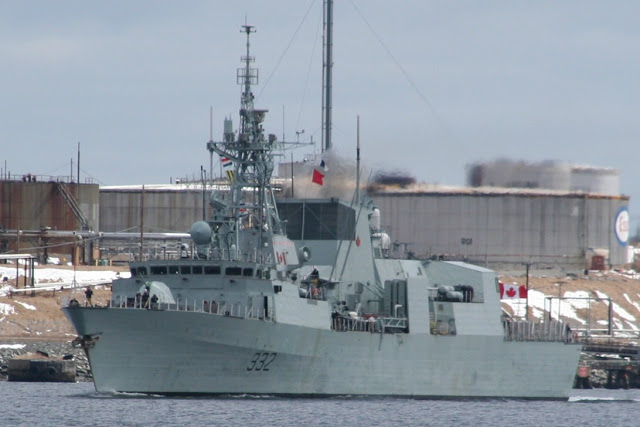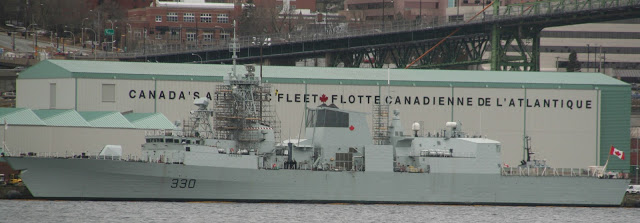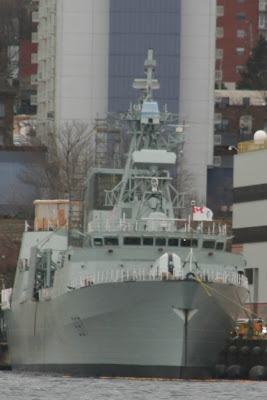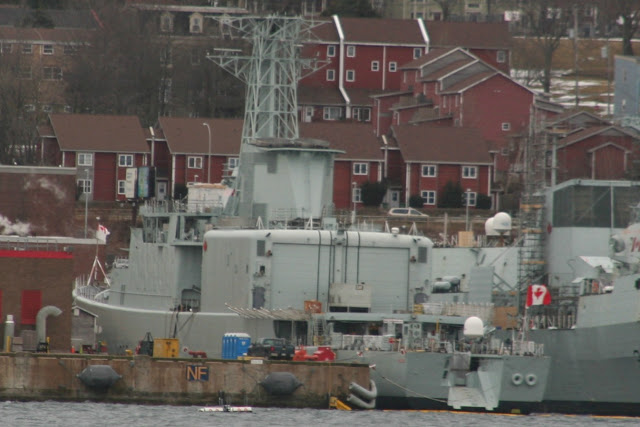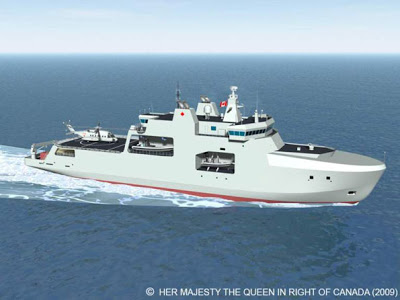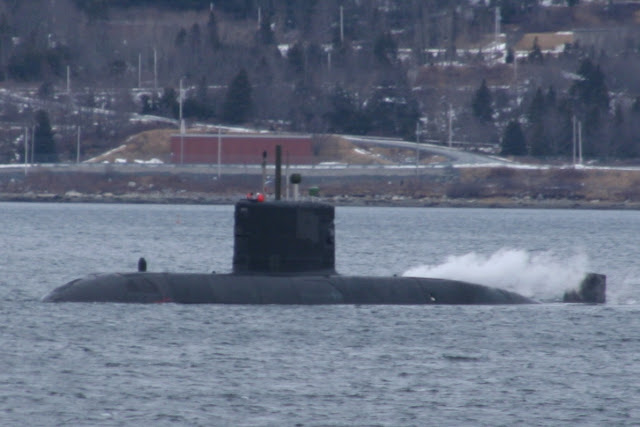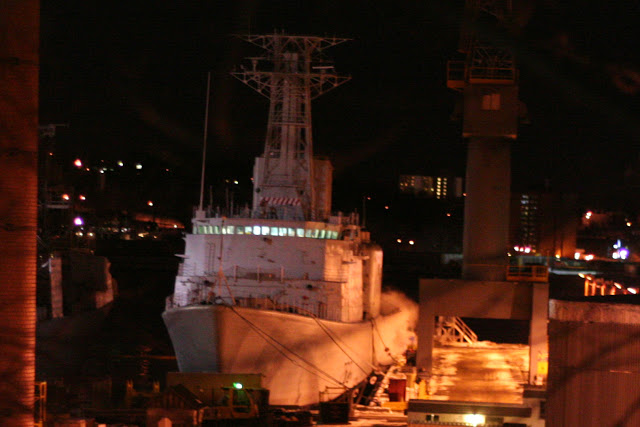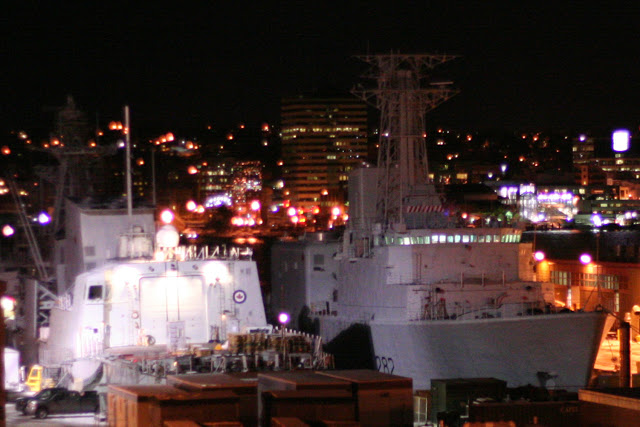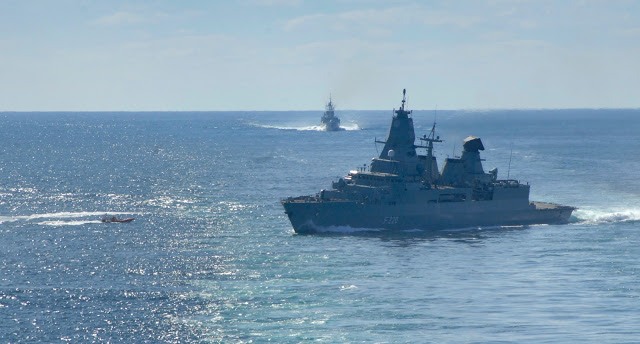HMCS Ville De Quebec sailed into Halifax, around 1 pm.
Category Archives: Navy
Naval Ship Updates
Contracts Signed for Final AOPS Design
The Honourable Rona Ambrose, Minister of Public Works and Government Services and Minister for Status of Women, along with the Honourable Peter MacKay, Minister of National Defence, and the Honourable Kerry-Lynne D. Findlay, Associate Minister of National Defence, today welcomed the signing of the definition contract with Irving Shipbuilding Inc. for the Arctic/Offshore patrol ships project through the National Shipbuilding Procurement Strategy (NSPS) at an announcement at halifax Shipyards.
This is the next contract signed after the ancillary one announced in July 2012 and it will be followed by a construction contract in 2015. This definition contract is a task-based contract divided into seven work packages (or tasks) that could be awarded. With this contract, Irving Shipbuilding Inc. will refine and complete the Arctic/Offshore patrol ships design to production level prior to construction in 2015. The total potential value of the contract is an estimated $288 million and it will support up to 200 jobs.
Once completed, the definition contract will enable Irving Shipbuilding Inc. to know exactly what to build and how to build it. It will ensure that once the build contract is signed, construction of the ships will begin. At the same time, work will begin on improving and upgrading the Irving Shipyard to begin full ship construction in 2015.
During the initial discussions regarding the Navy’s Arctic/Offshore patrol ships, Canada and Irving Shipbuilding Inc. agreed that the first contract should be a smaller preliminary contract, followed by a larger definition contract to complete the Arctic/Offshore patrol ships design to production level, and subsequently an implementation contract to build and deliver the ships.
This “design-then-build” approach will mitigate both technical and cost risks by reducing unknowns, and therefore risks, for the building phase. Once completed, the definition contract will enable Irving Shipbuilding Inc. to know exactly what to build and how to build it. It will ensure that once the build contract is signed, construction of the ships will begin immediately. This approach is also aligned with the NSPS, which is built upon a more collaborative and risk-sharing relationship.
On July 10, 2012, the Government announced the awarding of a $9.3-million (HST included) preliminary contract to Irving Shipbuilding Inc. Within this preliminary contract, Irving Shipbuilding Inc. reviewed the existing Canadian-developed Arctic/Offshore patrol ships design and specifications, prepared an execution strategy and delivered a proposal detailing the scope and cost of the subsequent definition contract.
Finally, on March 7, a definition contract with Irving Shipbuilding Inc. was signed. The total potential value of the contract is an estimated $288 million (taxes included). The definition contract is a task-based contract divided into seven work packages (or tasks) that could be awarded. The first two tasks have been authorized and their total value is approximately $136 million.
The definition contract will last 30 months and we are on track to start cutting steel in 2015.
The Arctic/Offshore patrol ships will be used by National Defence to conduct armed seaborne surveillance in Canada’s economic exclusion zone, including in the Arctic.
The definition contract signed with Irving Shipbuilding Inc. is a task-based contract divided into the following seven work packages (or tasks) that could be awarded. With this contract, Irving Shipbuilding Inc. will refine and complete the Arctic/Offshore patrol ships design to production level prior to construction in 2015.
- Project Management – This task will include all work required to ensure effective planning, management, execution, monitoring and control, and reporting of the definition contract work.
- Engineering Design Phase 1 – This task will include the system engineering activities, integrated logistical support analysis and supplier engagement activities that are necessary to demonstrate that the preliminary Arctic/Offshore patrol ship design meets all of the contract design specification requirements with acceptable risk and within the cost and schedule constraints.
- Engineering Design Phase 2 – This task will include the system engineering activities, integrated logistical support analysis and supplier engagement activities that are necessary to demonstrate that the Arctic/Offshore patrol ship design is a complete and integrated solution that meets all the contract design specification requirements with acceptable risk and within the cost and schedule constraints.
- Engineering Design Phase 3 – This task will include the system engineering activities, integrated logistic support analysis and supplier engagement activities that are necessary to demonstrate that the Arctic/Offshore patrol ship design is a complete and integrated solution that meets all of the contract design specification requirements and is ready for the start of vessel construction.
- Project Implementation Proposal Development – This task will encompass all the procurement, engineering, production and estimating activities required to develop the detailed project implementation proposal, including the required plans and a substantive cost for the implementation contract.
- Test Production Module – This task will include all the work required to establish and verify production processes and produce a test module prior to beginning vessel construction.
- Long Lead Items Procurement – This task will encompass all of the procurement and supply chain activities required to procure long lead items, which must be purchased prior to the start of vessel construction.
Once completed, the definition contract will enable Irving Shipbuilding Inc. to know exactly what to build and how to build it. It will ensure that once the build contract is signed, construction of the ships will begin.
HMCS Windsor in the Basin
Progress on non combat NSPS Ships
The Federal Government today announced a series of preliminary contracts valued at a total of $15.7 million for the joint support ships, the CCGS John G. Diefenbaker polar icebreaker and the offshore fisheries science vessels.
As part of the National Shipbuilding Procurement Strategy (NSPS), these initial agreements will enable Vancouver Shipyards Co. Ltd. to:
assist in the progression and assessment of the joint support ship design options;
initiate a review of the polar icebreaker design; and
refine the offshore fisheries science vessel design and specifications; and produce construction plans and determine requirements for material, subcontractors and labour.
As part of the non-combat package under the NSPS, the joint support ships will replace the Royal Canadian Navy’s auxiliary oiler replenishment vessels. The new polar icebreaker, the CCGS John G. Diefenbaker, will be delivered to coincide with the decommissioning of the Canadian Coast Guard’s heavy icebreaker, the CCGS Louis S. St-Laurent, and the offshore fisheries science vessels are intended to replace the CCGS Teleost, the Alfred Needler, and the W.E. Ricker.
FELEX Updates
with HMCS Fredericton clear of the machine shop wharf, HMCS Montreal is scheduled to move to Machine Shop wharf on Mar 15. This long delay between Fredericton and Montreal is likely to allow completion of the new structure on the wharf. Charlottetown is scheduled to go into graving dock April 1
Navy spy released from navy
Upon the recommendation of General Tom Lawson, Chief of the Defence Staff, His Excellency the Right Honourable David Johnston, Governor General and Commander-in-Chief of Canada, has approved the release of Jeffery Paul Delisle from the Canadian Armed Forces and has revoked his commission.
“The unauthorized disclosure of national and allied intelligence is both unconscionable and intolerable. Mr. Delisle’s actions were clearly not consistent with the high degree of integrity and loyalty to Canada that we, as Canadians, expect from our sailors, soldiers, airmen and airwomen,” said the Honourable Peter MacKay, Minister of National Defence. “Following the sentencing on Friday, the Canadian Armed Forces immediately undertook the required and appropriate action to review his file and ensure that all appropriate administrative measures are taken.”
“Mr. Delisle’s actions were neither excusable nor defensible. He broke the law, violated our core values of integrity and honour, and his actions were reprehensible,” said General Lawson. “He has demonstrated that he is neither worthy of the trust and confidence of the Crown, nor of his country. As a result of his misconduct Mr. Delisle has been released from the Canadian Armed Forces and his commission has been revoked.”
Mr. Delisle’s release for reasons of “service misconduct” will result in the following additional consequences:
— Mr. Delisle forfeits his Canadian Forces Decoration (a medal);
— Mr. Delisle forfeits his entitlement to severance pay; and
— Action will be taken to recover his pay from the date of his being
arrested and taken into custody.
On behalf of Her Majesty The Queen, the Governor General grants commissions to all officers of the Canadian Armed Forces. These commissions are held at the pleasure of and can be revoked by the Crown.
HMCS Athabaskan Moved
HMCS Preserver returns
Ville de Quebec on International Exercises.
HMCS Ville De Quebec is taking part in an composite training unit exercise (COMPTUEX) with the Aircraft Carrier USS Harry Truman, as a memeber of the 1st Combined Destroyer Squadron (1CDS) 1CDS members currently include USS Barry (DDG 52), USS Gravely (DDG 107), the German ship FGS Hamburg (F220), and the Canadian ships HMCS Ville De Quebec (FFH 332) and HMCS Preserver (AOR 510); USS Monterey (CG 61), USS Gettysburg (CG 64), and USS Kauffman (FFG 59).
COMPTUEX is a series of training scenarios designed to certify HSTSG as a deployment-ready fighting force capable of completing operations in overseas theaters. The exercise will be evaluated and graded by Commander, Strike Force Training Atlantic (CSFTA) through warfare scenarios that will include simulated surface, air undersea, strike and electronic attacks.
In addition, events such as maritime interception operations (such as visit, board, search and seizure [VBSS]), live-fire evolutions, and strike group formations will also be assessed by CSFTA.
German frigate FGS Hamburg (F220) (front) and Canadian frigate HMCS Ville de Quebec (FFH 332) move in formation during a simulated strait transit. Hamburg and Ville de Quebec are underway with aircraft carrier USS Harry S. Truman (CVN 75) conducting a composite training unit exercise in preparation for 1st Combined Destroyer Squadron’s (1CDS) upcoming deployment. (U.S. Navy photo by Mass Communication Specialist Seaman Apprentice Kameren Guy Hodnett/Released)

